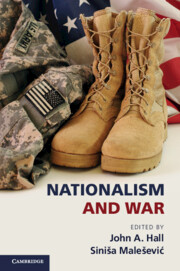Book contents
- Frontmatter
- Contents
- List of figures
- List of tables
- Notes on contributors
- Introduction
- Part 1 Fighting for the nation?
- Part 2 The varieties of nationalist experience
- Part 3 Empires and nation-states
- Part 4 Empty shells, changed conditions
- 11 Internal wars and Latin American nationalism
- 12 War and nationalism
- 13 Victory in defeat?
- 14 When nationalists disagree
- Index
- References
12 - War and nationalism
The view from Central Africa
Published online by Cambridge University Press: 05 April 2013
- Frontmatter
- Contents
- List of figures
- List of tables
- Notes on contributors
- Introduction
- Part 1 Fighting for the nation?
- Part 2 The varieties of nationalist experience
- Part 3 Empires and nation-states
- Part 4 Empty shells, changed conditions
- 11 Internal wars and Latin American nationalism
- 12 War and nationalism
- 13 Victory in defeat?
- 14 When nationalists disagree
- Index
- References
Summary
[T]he clue to an understanding of nationalism is its weakness at least as much as its strength. It was the dog who failed to bark who provided the vital clue for Sherlock Holmes. The numbers of potential nationalisms which failed to bark is far, far larger than those which did, though they have captured all our attention.
Ernest Gellner, Nations and Nationalism (1983: 43)The most obvious conclusion to be drawn from these wide-ranging inquests into the nexus between nationalism and war is the indeterminacy of the relationship. This is made reasonably clear in a number of chapters in this book. Chapter 7 by Michael Mann is one example among others: on the basis of the evidence from the First and Second World Wars, he points to the importance of the time frame and identity of the protagonists as major variables. In one instance nationalism was the product rather than the cause of the hostilities, and in the other Japan and Nazi Germany were the most obvious exceptions to the rule.
- Type
- Chapter
- Information
- Nationalism and War , pp. 306 - 320Publisher: Cambridge University PressPrint publication year: 2013
References
- 2
- Cited by



